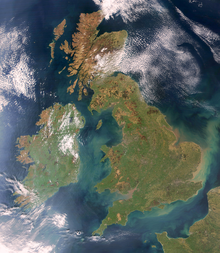| Revision as of 20:00, 9 December 2012 editR-41 (talk | contribs)44,778 editsNo edit summary← Previous edit |
Revision as of 20:04, 9 December 2012 edit undoR-41 (talk | contribs)44,778 editsNo edit summaryNext edit → |
| Line 2: |
Line 2: |
|
] of the United Kingdom, bearing the English red cross with white border, the Irish Saint Patrick's Saltire with a white border, and the Saint Andrew's Saltire and blue background. This is a common symbol used by British nationalists.]] |
|
] of the United Kingdom, bearing the English red cross with white border, the Irish Saint Patrick's Saltire with a white border, and the Saint Andrew's Saltire and blue background. This is a common symbol used by British nationalists.]] |
|
] from the United Kingdom, British nationalism typically focuses on the unity of ] and ].]] |
|
] from the United Kingdom, British nationalism typically focuses on the unity of ] and ].]] |
|
'''British nationalism''' is a ] which of the ] and ].{{sfn|Motyl|2001|pp=62-63}} It asserts that the British constitute a nation.{{sfn|Motyl|2001|pp=62-63}} It is closely associated with ], which seeks to uphold or strengthen the union between the countries of the British Isles.<ref name="Mil133">{{harvnb|Miller|2005|p=133}}.</ref> It is characterised as a "powerful but ambivalent force in British politics".<ref>{{harvnb|Smith|Smith|White|1988|p=61}}.</ref> In its moderate form, British nationalism has been a ], emphasizing both cohesion and diversity of the people of the British Isles and its former colonies – British nationalists hold that one can be ethnically English, Irish, Scottish, Welsh, or a person from a former British colony or descendent of a person from a former British colony and be considered British.{{sfn|Motyl|2001|pp=64}} Recently however, ] nationalism and extremist nationalism has arisen based on fear of Britain being swamped by immigrants; this anti-immigrant nativist nationalism has been present in the ] and other extreme nativist nationalist and neo-Nazi movements.{{sfn|Motyl|2001|pp=64}} Politicians, such as ] ] of the Conservative Party and his direct predecessor ] of the Labour Party, have sought to promote British nationalism as a progressive cause.<ref>{{cite web|url=http://en.wikinews.org/Gordon_Brown_calls_for_national_day_to_celebrate_'Britishness' |title=Gordon Brown calls for national day to celebrate 'Britishness' - Wikinews, the free news source |publisher=En.wikinews.org |date= |accessdate=2009-07-08}}</ref><ref>Conservative Party leader David Cameron advocates liberal or civic British nationalism: "Being British is one of the most successful examples of inclusive civic nationalism in the world." http://www.conservatives.com/News/Speeches/2006/09/Cameron_I_will_never_take_Scotland_for_granted.aspx www.conservatives.com Official party site (26 September 2006)</ref> |
|
'''British nationalism''' is a ] which of the ] and ].{{sfn|Motyl|2001|pp=62-63}} It asserts that the British constitute a ], rather than an identity of a collection of nations.{{sfn|Motyl|2001|pp=62-63}} It is closely associated with ], which seeks to uphold or strengthen the union between the countries of the British Isles.<ref name="Mil133">{{harvnb|Miller|2005|p=133}}.</ref> It is characterised as a "powerful but ambivalent force in British politics".<ref>{{harvnb|Smith|Smith|White|1988|p=61}}.</ref> In its moderate form, British nationalism has been a ], emphasizing both cohesion and diversity of the people of the British Isles and its former colonies – British nationalists hold that one can be ethnically English, Irish, Scottish, Welsh, or a person from a former British colony or descendent of a person from a former British colony and be considered British.{{sfn|Motyl|2001|pp=64}} Recently however, ] nationalism and extremist nationalism has arisen based on fear of Britain being swamped by immigrants; this anti-immigrant nativist nationalism has been present in the ] and other extreme nativist nationalist and neo-Nazi movements.{{sfn|Motyl|2001|pp=64}} Politicians, such as ] ] of the Conservative Party and his direct predecessor ] of the Labour Party, have sought to promote British nationalism as a progressive cause.<ref>{{cite web|url=http://en.wikinews.org/Gordon_Brown_calls_for_national_day_to_celebrate_'Britishness' |title=Gordon Brown calls for national day to celebrate 'Britishness' - Wikinews, the free news source |publisher=En.wikinews.org |date= |accessdate=2009-07-08}}</ref><ref>Conservative Party leader David Cameron advocates liberal or civic British nationalism: "Being British is one of the most successful examples of inclusive civic nationalism in the world." http://www.conservatives.com/News/Speeches/2006/09/Cameron_I_will_never_take_Scotland_for_granted.aspx www.conservatives.com Official party site (26 September 2006)</ref> |
|
|
|
|
|
==Nationalism and unionism== |
|
==Nationalism and unionism== |

